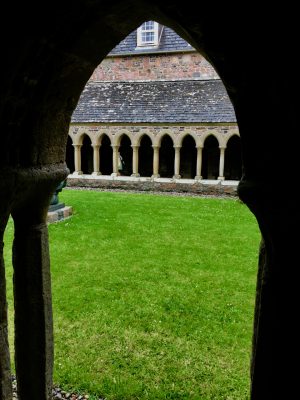 Wind howls on the farm here in New Mexico in late summer and fall. Not being a meteorologist, I am not sure why this happens, but it does. It is so windy here in the fall and winter that I almost re-named the house for the wind that swirls around it at night. The wind seems to travel along the base of the mesa and then, as if annoyed by the sharp turns, gallops straight down through the apple orchards and past onto my porch like a pack of race horses – careening into and swirling around the house like a wave of children being unleashed into an amusement park on opening day. It is simultaneously comforting and awe-inspiring – closely wrapping and yet at the same time almost invasively enfolding. When that smell of autumn just begins to play hide- and-seek with our psyche, we swoon. Fresh apples, yellow aspen, cool nights, gardens left ravaged after the bounty to which they have given birth. After late summer’s harbinger of fall comes the excitement of All Saints and All Souls – majestic mentors that dance around God’s throne and mischievous monsters that go bump in the night around our beds.
Wind howls on the farm here in New Mexico in late summer and fall. Not being a meteorologist, I am not sure why this happens, but it does. It is so windy here in the fall and winter that I almost re-named the house for the wind that swirls around it at night. The wind seems to travel along the base of the mesa and then, as if annoyed by the sharp turns, gallops straight down through the apple orchards and past onto my porch like a pack of race horses – careening into and swirling around the house like a wave of children being unleashed into an amusement park on opening day. It is simultaneously comforting and awe-inspiring – closely wrapping and yet at the same time almost invasively enfolding. When that smell of autumn just begins to play hide- and-seek with our psyche, we swoon. Fresh apples, yellow aspen, cool nights, gardens left ravaged after the bounty to which they have given birth. After late summer’s harbinger of fall comes the excitement of All Saints and All Souls – majestic mentors that dance around God’s throne and mischievous monsters that go bump in the night around our beds.
The wind howls and howls and howls on this farm. Kai-the-dog and I sit huddled on the bed: his ears can hear coyote outside pacing past the chicken house. The chickens are safe, and so are their eggs. When I open my Hebrew Bible to the first page (seemingly at the end of the book, because Hebrew is read from right to left so its books read from back to front) the first words I read say: “When God began to create heaven and earth — the earth being unformed and void, with darkness over the surface of the deep and a wind from God sweeping over the water — God said ‘Let there be light’; and there was light.” I marvel at how much set-up goes into this first creative act. God’s first act is not to create light. God’s first speaking act is to create light, but God’s first act is to sweep as a wind over the earth. This word “sweeping” in the form of wind or breath is, in the Hebrew “raw-khaf,” which actually means “to move as brooding.”
So God broods — in the form of breath — over the face of the formless, deep void of what would become our planet and our humanity in the creation story. Sometimes, when going in to get eggs on the New Hampshire farm, I hesitate outside the window and look in at them. In the darkness, most of the chickens are on their perch over by the Raku Kiln House. There is always a chicken in one of the brooding boxes sitting on her eggs – her brood. She is brooding. She looks so calm. She is not hypervigilant nor is she bored. She seems centered – focused – like a wide-eyed Buddha. She is protecting the soon-to-be-born. Her body warms them with soft, dry, downy heat and feathers. To get to the eggs, one has to go through the mother hen. She is fierce when threatened, but mostly she just sits, like a queen on her pillow-throne.
Turning, turning, turning the eggs – up to five times an hour – to be sure they are warmed entirely and evenly. To brood is to be very, very close – gentle with power, thick and muscular with protection, fierce with defense and soft with hope — like the lambskin glove my grandmother wore when she caressed my cheek and told me I was loved. As I get older and live more and more of life, I am becoming more and more aware of how naive I tend to be. Life tends to toughen us. We lose our innocence and sometimes – even if just for a season, we lose our laughter or at least our giggle. We begin to accept that some of the animals that stroll past the chicken coop are not well-intended towards the chickens and their little defenseless eggs. In the windy darkness of life we can sometimes confuse the saints and the souls in the symphony of branches dancing in the windy moonlight. But when it is windy out, I try to remember this moment in the creation when God is in the midst of life-giving and is showing a powerful feminine side – brooding – protecting – watching – defining.
God broods over us with the assurance that “All shall be well and all shall be well and all manner of thing shall be well.”

